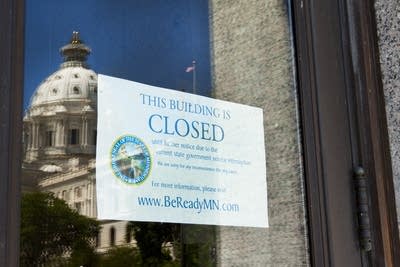Democrats try to make last year's government shutdown a campaign issue
Go Deeper.
Create an account or log in to save stories.
Like this?
Thanks for liking this story! We have added it to a list of your favorite stories.

The deep budget disagreements that led to last year's state government shutdown are still echoing a year later on the campaign trail.
DFL and Republican candidates for the House and Senate remain miles apart when it comes to taxes and spending. And as they try to regain the majority in the state House and Senate, Democrats say that another shutdown could be looming if Republicans retain control.
Even though state officials have determined that the net financial cost of the 20-day shutdown was minimal, there still could be a political price to pay on Election Day, when all 201 legislative seats are up for grabs.
The shutdown clearly emerged as a campaign issue earlier this month at the DFL state convention in Rochester. Standing on a stage full of Democratic legislative candidates, House Minority Leader Paul Thissen of Minneapolis tried to show how his party's priorities contrast with the GOP.
Turn Up Your Support
MPR News helps you turn down the noise and build shared understanding. Turn up your support for this public resource and keep trusted journalism accessible to all.
"Republicans have made it very clear what their priority is, and that is protecting the wealthiest Minnesotans and big corporate special interests," Thissen said. "They actually took this state to shutdown to defend that priority."
Thissen said he thinks Democrats could win back control of the House this year, and he thinks last summer's shutdown will loom large in the individual campaigns.
"The main thing we're encouraging our candidates is what's important in their district," Thissen said. "But secondly to focus in on this fundamental issue, which is 'Where are your priorities? What side are you on?' And the shutdown is a very good example of that."
MINNESOTANS HAVE MOVED ON, REPUBLICANS SAY
Thissen and other Democrats insist that the shutdown remains a sore spot with voters. But a key Republican disagrees. Senate GOP Majority Leader Dave Senjem of Rochester said he hasn't run into anyone who's still thinking about last summer.

"It's not talked about," Senjem said. "I think people have generally moved on. It's certainly possible that the DFL will bring it up, certainly in debates and forums and things like that. But it just seems to be old news."
Senjem said the shutdown is not a fond memory and it should have never happened. But a year later, he sounds more than a little proud of the stand his side took against Gov. Mark Dayton and his proposed income tax increase.
LESSON LEARNED?
Republicans are still pledging to oppose any tax increases, and that's what worries Senate DFL Minority Leader Tom Bakk of Cook. With another budget deficit anticipated next year, Bakk said he thinks the state could be headed toward another shutdown — if Republicans retain their majorities.
"There's going to be some very, very difficult decisions made next session, both on the spending side and on the revenue side," Bakk said. "If they decide not to consider revenue, I think our schools are in for another really tough session. Hospitals are probably in for a real tough session, as we look for places that cuts can be made."
But Republicans insist that their efforts to rein in government spending have already improved the state's financial picture, and they're ready to do more. House GOP Majority Leader Matt Dean of Dellwood said there's no reason to believe another shutdown is inevitable.
"It's our hope that everybody learned a good lesson, which is that government was big enough," Dean said. "We didn't have to raise taxes. We didn't have to grow government even bigger, and if we did, we'd be in a bigger pickle right now."
Dean, like Senjem, believes that voters are no longer thinking about last summer's government shutdown. He said he thinks they're much more concerned this year about the need for an improved economy and more jobs, which is what GOP candidates plan to focus on as they campaign.
Dear reader,
Your voice matters. And we want to hear it.
Will you help shape the future of Minnesota Public Radio by taking our short Listener Survey?
It only takes a few minutes, and your input helps us serve you better—whether it’s news, culture, or the conversations that matter most to Minnesotans.




